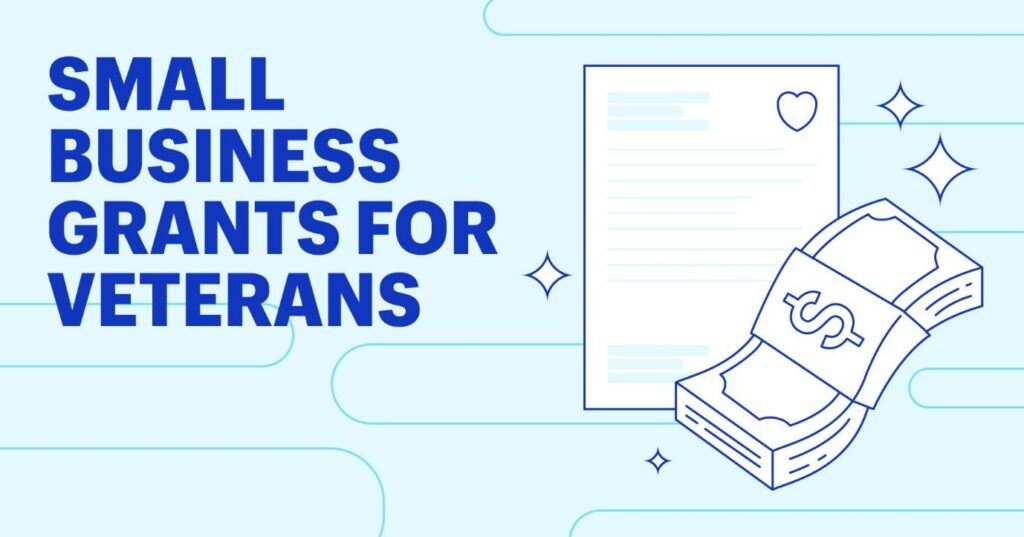According to the U.S. Census Bureau, veterans comprise of around 7% of the adult population in the United States (18 million Americans). In addition, veterans employ almost 4 million people and own about 6% of all enterprises in the United States.
Many tools are available to support veterans who own or wish to establish a small business. Veteran-focused small business grants may be an excellent source of funding to expand and improve your business.
There is typically a lot of competition when it comes to grants. However, because of the more selective application process, you may be more likely to be approved for veterans’ small business grants than specific business finance alternatives.
We will examine various grant categories, qualifying standards, application advice, and helpful links to assist veterans in navigating the grant environment and realizing their goals.
Tips for Applying for Veteran Business Grants

Applying for veteran business grants can be a strategic way to secure funding for your venture. Here are few tips to enhance your chances of success:
Check Eligibility.
Meet all eligibility requirements before applying for veteran business funding. Some subsidies may be restricted to specific groups, such as injured veterans or those who received honorable discharges.
Follow the instructions.
Complete the application thoroughly and include any relevant documentation. Pay close attention to deadlines to ensure you get all the funding chances.
Consider Reviewers.
Understand who will be reviewing your application and what they are searching for. Provide specific information about your firm and how the funding will help it expand.
Proofread
Before submission, thoroughly proofread your application and documents. Grammatical errors or missing information could negatively impact your chances. Strive to make your business stand out from other applicants.
What are the requirements for small company grants?

Veterans seeking a business award should expect a lengthy application process that requires tight guidelines, timetables, and other qualifying criteria.
Furthermore, students should be aware that competition for this form of funding is fierce, and even if they do qualify, the award amount may need to be increased, forcing them to seek additional money.
Many business grants are related to specific aims, such as entrepreneurship, education, creativity, or motivation, and selection committees have complete control over the award process and distribution of funds.
In addition to completing the eligibility requirements of each program, veterans will typically need an effective business plan that includes a feasibility analysis and an explanation of how they intend to continue the endeavor after the award term.
Which business grants for veterans are available?

There are numerous forms of business grants for veterans. Award amounts, qualifying requirements, and selection committee objectives vary by source.
You can check http://grantsforveterans.org/ for more details on eligibility criteria and required documents.
The Second Service Foundation
A nationwide grant program for veterans, military spouses, and Gold Star Family entrepreneurs. Winners pitch business ideas to compete for small business grants. Award amounts vary by location.
Warrior Rising
This free program offers comprehensive support for veterans launching or expanding businesses. Features include entrepreneurial education, training, coaching, mentorship, and connections to clients, investors, and funding opportunities. The program is open to veterans and immediate family members. Application is required.
Feed the Soul Foundation’s Restaurant Business Development Program
The Feed the Soul’s Restaurant Business Development Grant is accessible to food businesses that are at least 51% owned by people who are Black, Indigenous, Latinx, LGBTQ+, military veterans, people with disabilities, or formerly incarcerated individuals. Its goal is to level the playing field for veteran hospitality business owners. Participants in the program may receive six months of consultations and educational training services, as well as a stipend and training to assist with the processing and maintenance of their firm.
Chicagoland Job Creators Quest Grant
$255,000 in financing is awarded to 25 Illinois-based small businesses through the Chicagoland Job Creators Quest Grant. The eligibility needs are as follows: the business must be for-profit, have more than two employees, have a founder from an underrepresented group, and pledge to create an additional twelve months’ worth of premium minimum-wage jobs. The business must also have revenues between $100,000 and $5 million.
FedEx Small Business Grant Contest
Open to small businesses in the United States that have been operational for at least six months and have a FedEx business account, the FedEx Small Business Grant Contest is an yearly competition. Presenters explain to the audience how receiving a grant could help their company. With a $50,000 first prize and nine $20,000 runner-up prizes, the $230,000 total prize pool is split among the ten winners. Additionally, FedEx small business services are free of charge for all winners.
Farmer Veteran Fellowship Fund
The Farmer Veteran Fellowship Fund offers grants of up to $5,000 to support veterans just starting in farming or ranching. The fund does not provide the veteran with direct funding; instead, it assists in acquiring supplies required to begin a farm company. Applicants must submit a solid business plan and evidence of service.
Michigan Veteran Entrepreneur-Lab
Grand Valley State University oversees the free three-month Michigan Veteran Entrepreneur Lab, a business accelerator program for veterans and spouses of active duty in the state. The program also provides participation in the Pitch Showcase, where business concepts can win up to $20,000 in cash awards and practical startup education.
Texas Woman’s University Veteran Woman Entrepreneur Grant
To qualify, you must operate or intend to operate a Texas-based firm that is at least 51% directly owned and maintained by one or more veteran women who are US citizens or US permanent residents. Your business must be a for-profit corporation, partnership, LLP, LLC, or sole proprietorship.
Alternatives to Veterans’ Small Business Grants

If you’re struggling to secure a grant, there are additional funding sources for your business, including:
Family loans: Consider loans from family or friends, a standard option for 19% of new businesses. Draft a formal loan agreement to clarify repayment terms.
Small business loans: Over half of all business owners eventually rely on these loans. They offer funding but come with stricter qualification criteria.
Peer-to-peer (P2P) business loans: While less common due to fintech trends, some P2P lenders still offer loans. Explore this option if you need help to qualify elsewhere.
The Final Thought
Looking for veteran business grants can be a brilliant idea if you’re a veteran trying to launch or expand your company. Grants can give you the money you need, and the fact that they are non-repayable is a significant advantage.

